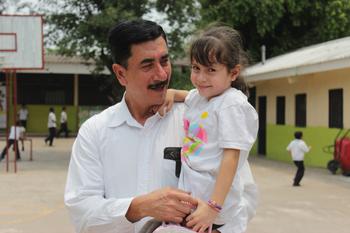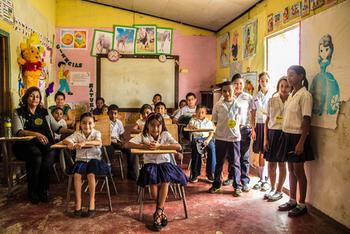Approach
The APRODE programme builds on the results of the preceding programme, which was entitled Promotion of the Quality of Basic Education in the Context of the Education for All – Fast Track Initiative (EFA-FTI), PROEFA. APRODE focuses its activities on the decentralisation process pursuant to the new basic law on education.
APRODE supports four key areas of educational reform:
- Advising the national Ministry of Education on its normative tasks within the decentralisation process;
- Supporting the district school management boards in the decentralisation process;
- Supporting the school networks in strengthening participation by parents and students, and in building up educational opportunities that encompass both pre-school and extended primary education;
- Promoting the participation of local communities and civil society associations in putting the educational reform into practice in the municipalities.
Working groups have been set up in coordination with key participants from a Round Table of donors in the education sector, in order to support the Ministry of Education in implementing the new law. They deal with such topics as school networks, decentralisation and pre-school education.
APRODE cooperates with other GIZ programmes, in particular with the regional programme Preventing Youth Violence in Central America, a primary education programme in Guatemala and the project Promoting Non-formal Vocational Training in Honduras. In addition, the project works with the KfW Development Bank and with donors such as the United Nations Children’s Fund (UNICEF) and Canada.
Results
The steering structure introduced by APRODE has improved communication and cooperation between the departments in the Ministry of Education. The Minister has declared that the reduction of corruption risks, improvements to internal controls, and policy-making are her top priorities. This is reflected in the agreement between the Honduran Government and Transparency International, which aims to curb corruption in five ministries, including the Ministry of Education. Support from APRODE has cut corruption risks by more than 15 per cent since 2015.
Personnel management is at the heart of the decentralisation process, which has involved 11 of the 18 district school management boards since 2016. The working group of district school managers in the west of Honduras serves as a reference and source of information for two other networks in the northern and central regions. Strengthening the networks fosters communication, coordination and the transfer of knowledge about the decentralisation process.
Enrolment rates in pre-school and in the seventh to ninth grades are rising steadily. School networks have received advice on drawing up a sustainable strategy. Several departments in the Ministry of Education that were not previously involved have now been brought on board. There are currently more than 1,800 school networks in the country, one third of them in the area covered by the programme. To improve their organisation, the online platform SIARED was developed; it supports the networks in administrative matters, planning and knowledge management.
With a view to increasing the level of parental participation, the Ministry of Education made the ‘school for parents’ obligatory in 2015. The Ministry reported that by the end of 2016 over half a million parents had attended courses. Around 70 per cent of the schools integrated in school networks have a registered parents’ representative council governed by a national regulation that was prepared in a participatory process.
A pilot project designed to encourage student participation is being conducted as part of APRODE’s children’s rights approach. In this context, the programme is working with the Pestalozzi Children’s Foundation, the Honduran children’s rights organisation COIRPODEN and UNICEF. More than 400 schoolchildren are preparing a national regulation on student representation, which will be presented to the Minister of Education and officially adopted in 2017. Furthermore, APRODE assists the Ministry of Education in monitoring the mandatory 200 days of schooling. Parents can use the mobile app VACLASES to register the days of instruction actually provided for their children.


